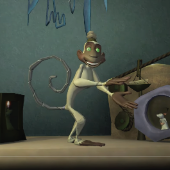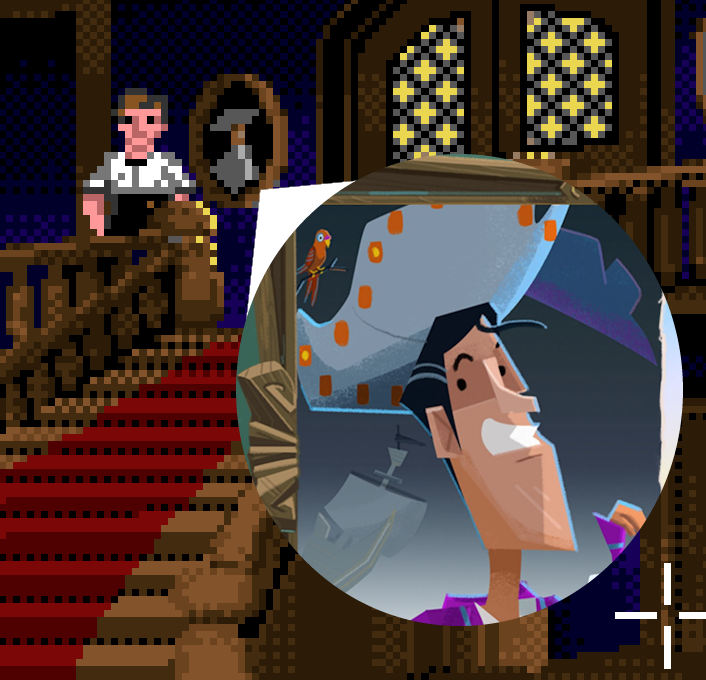Leaderboard
Popular Content
Showing content with the highest reputation on 07/28/23 in all areas
-
2 points
-
Looks like somebody’s broke out of the village and explored the entire fully rendered island. Spoilers for part 2 obviously.2 points
-
Has anyone played these games? They're point and click adventure games. Pretty goofy. Actually quite funny. There's no malice to them, just a lot of happiness hormones. The original was balm for my soul; the sequel's been great on the afternoons I play it when I'm down. You play as a detective of the paranormal in Twin Lakes City. The cases are called things like "Malice in Wonderland". I think everyone here would like them. They've got the LucasArts+ approach of no dead-ends and no dying.1 point
-
Return of the Obra Dinn is one of the greatest games I have ever played. I wish I could forget all about it so I could experience it for the first time again. But nonetheless, I still had a tremendous time replaying it a couple of years later. Cannot recommend it enough1 point
-
1 point
-
1 point
-
1 point
-
👕 I beat #MojoleXtreme #493 and all I got was this stupid t-shirt. 1/6 💚💚💚💚💚💚 https://funzone.mixnmojo.com/Mojole/ I had a vague inkling what today's answer was1 point
-
DREAMM 2.1b10 is now up: https://aarongiles.com/dreamm/beta New in 2.1b10 ============= * Upgraders now work from the command line as well * Added status messages to upgradeable games with links to the updaters * Fixed extra scrollbar in Yoda Stories/Indy Desktop dialogs * Fixed broken Load Game configuration option in GOG Infernal Machine * Fixed width of overlay and protection helper messages * Fixed missing icon in some Infernal Machine dialogs * x87 emulator now honors single-precision configuration1 point
-
The Fate of Atlantis and Woodtick scripts have been updated with a couple of new decompiler features: The macro restoration has become more robust, meaning it can restore more of the macro calls correctly. So, even closer to the original readability. That includes turning: start-sound largo-theme flush-sound-q ... into the original macro call: quick-start-sound largo-theme But more substantially, turning: for foo = 120 to 128 ++ { verb foo off } verb dialog-up-arrow off verb dialog-down-arrow off screen-escape-array = 0, 0, 0, 0, 0, 0, 0, 0, 0 say-screen-escape is 0, 0, 0, 0, 0, 0, 0, 0, 0 cursor off userput off ... which disables the dialog interface when a dialog ends - into the "slightly" more concise original call: cancel-dialog The FOA script also shows quite a few examples of a commonly used macro (although it happens to not be used at all in the Woodtick script) - run-script - which would start a script and then wait for it to finish running before continuing the current script. If you compare to the previous version of the decompiled FOA script, you'll see that the macro just calls start-script and then loops over a call to break-here until the script that was started has stopped running. The other major change in the decompiler is adding declaration of room local variables. A "bit" of an explanation of that one, since it's not actually documented in any (publicly available or otherwise) official documentation of SCUMM: Room local variables SCUMM (obviously) had support for global variables from the start. The first 50-100 (circa) of these were system variables declared and understood by the compiler and engine - for things like the selected actor, the soundcard, the machine speed, the cursor position, etc. The rest were game specific and declared in SCUMM scripts. Mostly each of these variables had a specific relatively local purpose and were named as such - e.g. something like visited-iceland. A few, however, were reused for all kinds of purposes across scripts - this helped reduce the amount of memory allocated for global variables. The first couple of these - which were already there in Maniac Mansion - were named foo and bar (the latter was renamed around MI1 for possibly obvious reasons - hint: MI1 and MI2 both have a room named bar 😉). Global variables could be integer numbers or arrays (or bits or strings - which had their own dedicated space. In SCUMM 6 - from DOTT - nibble, byte, and word variables were also added). When scripts local to a room were added for Last Crusade, local variables - local to the scripts - were also introduced. However, sometimes (quite often) you need variables that can be shared between all the scripts in a single room, but are still local to that room. Unlike script-local variables, this wasn't implemented as a compiler and engine feature, but rather, was implemented by a bit of (ab)use of functionality provided by the two: Global variables were declared in a dedicated SCUMM script, defining the name of each variable, and the "slot" (just a relative pointer to its location in memory). Using one of two syntaxes: variable selected-actor @ 1 Which would declare that the variable selected-actor would be in slot 1. (This was the typical way the system variables were declared in the script). Or: start-variables 100 variable foo variable bar variable some-array[10] variable visited-iceland Which would place foo in slot 100, bar in slot 101 etc. some-array would simply take up the next 10 slots, 102-111, with visited-iceland being in slot 112. So, in order to add "room local variables", you'd do this: Add an array to your global variables, named, say, room-local, with, say, 14 items (this was the typical number) At the top of each room needing room local variables, simply use the above syntax: start-variables room-local variable time-to-nuke-largo variable looked-at-money variable out-of-money-lines ... which would place time-to-nuke-largo at the same slot as room-local - in other words, it would be at the same location in memory as room-local[0]. In a different room, you could then have another set of variables, pointing to the same array. This is exactly what can be seen in the woodtick script (and similarly in the new-york-street script). So, you could have up to 14 variables that were specific to a room, but only took up 14 variable slots of memory across the game. To make it a bit cleaner, another feature was used: Every room in SCUMM can have an enter and exit script, which defines a script to be executed when you enter/exit that room. However, there was also two global enter scripts - and two global exit scripts - assigned during the boot script. Which would be run respectively before and after the individual room's enter/exit scripts - for every room. In one of these, you could place a for loop, which would iterate over the room-local array and set each item to 0. That way, whenever the player entered a new room, the room local variables would start out with a clean, default, 0 value. Just another example - much like the dialog system - of the kind of flexibility SCUMM allowed without actually needing changes to the compiler or interpreter. 🤓1 point
-
Yeah, if this is acceptable on the Mojo forum, I might make another thread for non LucasArts posters.1 point
-
Here are three versions, cropped slightly on the sides to fit a 3:4 aspect ratio, in clean/logo/credits flavors.1 point
-
0 points




28Jul202307_48_46.thumb.png.5018bbf9e940620ff889aa4d6ee96ac8.png)
28Jul202307_49_35.thumb.png.717845155a0d066e407efbfa3dc6613b.png)
28Jul202307_53_55.thumb.png.1b0e13da0758e544b8beac0192a311bd.png)
28Jul202307_54_02.thumb.png.3609cd0f737f745a6c43aed618ead238.png)
28Jul202307_55_15.thumb.png.01aa0b4833f95141a04b2354f9b1bac3.png)
28Jul202307_56_42.thumb.png.b279d945d78fcd97d45ff709604d92c6.png)
28Jul202307_57_10.thumb.png.7a3854d3a26845d2fad7c4e1f94d8508.png)





